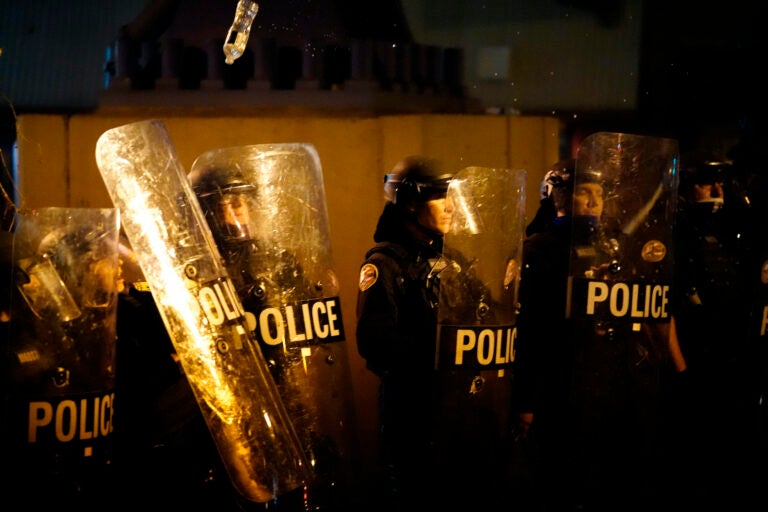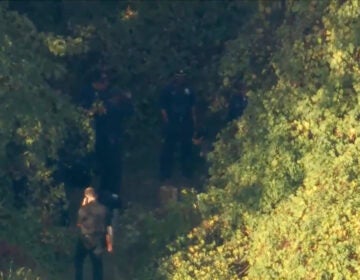Philly Police Department seeks outside funding for early intervention system
Implementing the system is part of the city’s Pathways to Reform, Transformation and Reconciliation, launched after protests of police brutality and racism.

Philadelphia police face protesters following the killing of Walter Wallace Jr. in West Philadelphia. (AP Photo/Matt Slocum)
The Philadelphia Police Department is seeking outside funding to implement an early intervention system, an electronic database designed to manage and retain personnel, as well as flag problem officers whose behavior may warrant some form of discipline.
At the same time, the department is working with the city’s Office of Innovation and Technology to identify a potential vendor for the system, so the city can make a final selection once funding is secured.
The hope is to have both pieces in place by the end of the first quarter of 2021. It’s unclear how much the system will cost the department in the long run or when the department will actually launch the new system.
“Implementing a new system is a very large undertaking. We won’t have an accurate handle on how long transitioning our current systems into the new software will take until the vendor gets their hands into the pot,” said Sgt. Eric Gripp, a police spokesman.
Gripp said the new software will run about $500,000 the first year. “Ongoing costs are all part of the negotiation process,” he added.
The Philadelphia Police Foundation is helping the department raise money for the intervention system, said Gripp. The foundation is the only organization authorized to raise funds for the department, according to its website.
Funding for the new technology was not part of the police force’s last budget request, said Gripp, adding that new expenditures were not being considered right after the department was asked to make “significant” budget cuts in June.
Since then, the police department has also made two multimillion-dollar requests for additional funding, though it’s unclear where the money will come from as the city continues to grapple with the economic fallout caused by the COVID-19 pandemic.
In June, after nearly two weeks of protests and civil unrest following the police killing of George Floyd in Minneapolis, Mayor Jim Kenney rescinded his proposed $19 million budget increase to the Philadelphia Police Department, which became a rallying point for police reform advocates. Another $14 million was later diverted to the Managing Director’s Office to fund crossing guards and public safety officers.
Following the police killing of Walter Wallace Jr. in West Philadelphia in late October, the department requested $14 million to equip thousands of officers with Tasers. At that point, about 2,300 officers were outfitted with the electronic devices. The department wants to buy Tasers for up to 4,500 more officers.
Roughly two weeks later, the police department asked the city to provide an additional $17.7 million to cover contract raises and protest-related costs that exceeded its approved budget.
The department’s annual budget is $750 million.
Implementing an early intervention system is part of the city’s Pathways to Reform, Transformation and Reconciliation, a reform initiative launched in June in response to the George Floyd protests against police brutality and institutional racism.
That month, Commissioner Danielle Outlaw announced several changes to PPD’s use-of-force policies. Sitting or kneeling on a person’s neck, face or head is now expressly prohibited. Outlaw also declared a moratorium on the use of tear gas during peaceful protests and on the use of no-knock warrants.
Following Wallace’s shooting death, the city also committed to implementing several police reforms tied to mental health, which advocates are urging the Kenney administration to expedite. Wallace’s family said the 27-year-old was experiencing a mental health crisis when officers responded to the 6100 block of Locust Street on Oct. 26.
Roughly a week later, 911 call-takers were given behavioral-health screening questions to better identify when calls involve crises of that nature.
The city’s Department of Behavioral Health and Intellectual disAbility Services has also stationed a clinically trained behavioral health provider in the 911 radio room to listen to help recognize and accurately label calls involving someone in mental or emotional distress. The hope is that flagging these calls will give the department the ability to dispatch officers trained in crisis intervention, and potentially a behavioral health specialist, to the scene so there is a better chance of de-escalating the situation.

Get daily updates from WHYY News!
WHYY is your source for fact-based, in-depth journalism and information. As a nonprofit organization, we rely on financial support from readers like you. Please give today.





